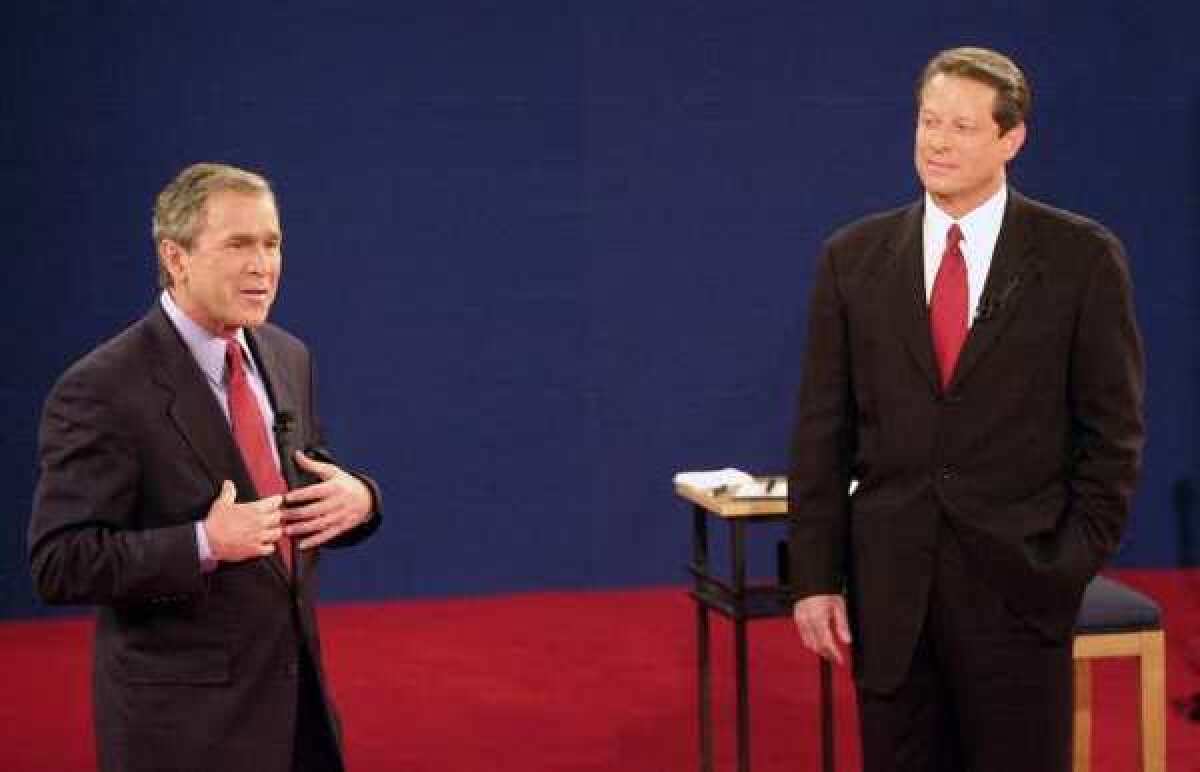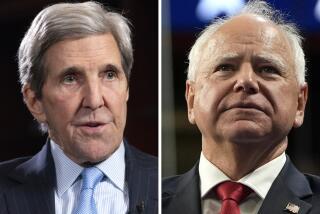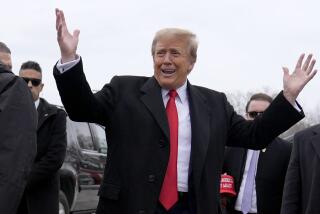Past Septembers show Obama-Romney could go any which way

In the dog days of the presidential race, with the conventions over and debates still to come, it’s tempting to anticipate that watershed moment when the momentum of the campaign will finally turn.
What we mostly have gotten is more of the same. President Obama holds a narrow, not statistically significant, lead over challenger Mitt Romney. The Republican can’t seem to find a game-changing moment.
But unrest and frightening television images from the Muslim world remind us of the possibility that the campaign quickly could be overtaken by events in the real world.
Reviewing the record for several Sept. 14ths in recent U.S. presidential history reveals several things: Front-runners can fade; odd turns are almost the norm; Republicans once competed for votes in California; and, finally, no matter how much money the candidates spend, they find a way to spend more the next election cycle.
1988: At this time that year, Vice President George H.W. Bush met with Latino political leaders in Orange, Calif., and with farmers in the Central Valley town of Kingsburg. He talked about how Democrat Michael S. Dukakis sounded anti-trade and how that would hurt agricultural exports.
The Republican ended up beating the Massachusetts governor by more than 300,000 votes in the Golden State on his way to the White House.
2000: On this date 12 years ago, another vice president, Al Gore, was surging in the polls and seemed to get the upper hand when he coaxed Texas Gov. George W. Bush to compete in three televised debates.
Some pundits thought Gore would have the advantage, but his audible sighing in one debate and aggressive approach toward Bush in another didn’t win over many voters. Gore won the popular vote and lost the election, after a recount in razor-close Florida.
2004: Sept. 14 eight years ago produced one of those moments in a campaign that seem definitive, then end up meaning nothing or something entirely unexpected. CBS News had recently come out with its story citing once-secret memos that purported to show that George W. Bush’s commanding officer in the Texas Air National Guard had serious problems with the young flier’s performance.
The memos would shortly prove to be fakes, a stain and major setback for the news network and for anchor Dan Rather, who presented the story. On that day, though, a secretary who had worked for Bush’s commanding officer rendered a fascinating split decision. In interviews, secretary Marian Carr Knox said the memos released by CBS (which she presumably would have typed) appeared to be fake.
But Knox also said the commanding officer had real concerns about Bush’s failure to take his physical examination in 1972, which prevented him from flying, and about efforts by higher-ups to protect the future president from the fallout.
The fakery surrounding the memos became the only thing most people remember about Bush’s military service. The story faded. And Bush went on to a narrow victory over John F. Kerry, the Vietnam combat veteran whose own service also came under scrutiny in the race.
2008: The mid-September news reports from just four years ago now appear almost quaint in how breathless they were about massive fundraising and spending, particularly by Democrat Barack Obama.
The U.S. senator from Illinois had just taken in $66 million for the month of August, $20 million more than Republican opponent John McCain. The Democrat by then had raised an aggregate $450 million since beginning the campaign in 2007, making him the most successful fundraiser in U.S. political history.
That looks like a mere bag of shells compared with the money rolling in for Obama, Romney and “super PACs” in 2012.
Obama and the Democratic National Committee reported raising $114 million in August, just ahead of Romney’s reported $112 million. Romney began the month with a lead of about $60 million cash on hand over Obama. Conservative super PACs alone are projected to spend more than $1 billion to try to defeat Obama this year.
Mark McKinnon, the veteran political ad man, marveled at the excess. “Seventy-five percent or more” of that money “will go into advertising,” McKinnon said via email, “of which 75% or more will be completely wasted. The campaigns simply don’t need this much money.”
This offers a marketing opportunity for California: Offer vacation packages for all those battleground state voters, battered by endless election advertising and looking for a place to cool their heels until election day.
Twitter: latimesrainey
MORE COMMENTARY FROM JAMES RAINEY:
Rush Limbaugh discovers another left-wing plot that isn’t
Obama says he’d walk GOP dogs, wash cars for a little cooperation
You might not see many pics of Obama raising money with Beyonce
More to Read
Get the L.A. Times Politics newsletter
Deeply reported insights into legislation, politics and policy from Sacramento, Washington and beyond. In your inbox three times per week.
You may occasionally receive promotional content from the Los Angeles Times.











